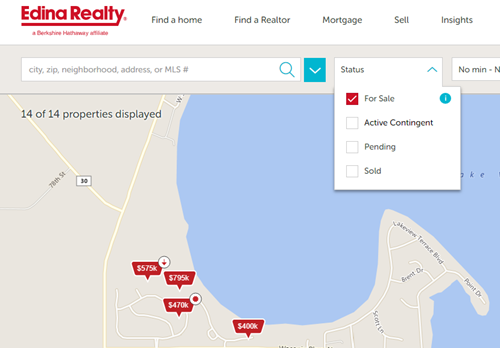
If you’re a homebuyer searching for homes online, you may find yourself falling for homes that are labeled “Active contingent,” but do you know what contingent means?
In short, a contingent property is under contract with another buyer, but the final sale of the home is dependent (contingent) on a specific set of criteria that must be met. If the property falls short of those expectations, the buyer is able to rescind their offer.
Pending status
After some of a sale’s contingencies have been removed, the home will be listed as “pending.” A pending property status means that the sale is more imminent and both the buyers and sellers are marching toward the closing table, usually subject only to a financing contingency, sign-off on the title and a final walk-through of the property.
Common contingencies
There are many different types of contingencies, but here are some of the most common scenarios.
Contingent, subject to inspection: The buyer and seller have signed a purchase agreement (contract), but the buyer is allowed to cancel the deal if the buyer does not like the results of the home inspection. Usually these inspections take place a few days after the purchase agreement is signed.
Contingent, sale of another property: The buyer and seller have signed a purchase agreement, but the buyer is allowed to cancel if the buyer's own home does not sell. This may be critical for the buyer, who is protected against having to buy before they have sold their current home. But the seller may call the contingency — which happens often, if the seller receives another offer — and the buyer may lose the deal if they cannot get their home sold within a short period of time. Likewise, a seller may list their home for sale contingent upon finding a new home.
Contingent, subject to third party approval: The buyer and seller have signed a purchase agreement, but the seller's lender must approve the sale because the sale proceeds will not be sufficient to pay off the seller's mortgage loan.
Contingent, subject to statutory right of rescission: The buyer and seller have signed a purchase agreement, but the buyer has a limited period of time to cancel the contract under a state law that provides a rescission period for the purchase of condos, townhomes, or cooperatives.
There are also other contingencies, including those related to financing, that fit into a different category. Ask your Realtor for insights about these types of contingencies and how they could affect your home purchase or sale.
Can I tour a home that’s listed as contingent?
Technically, yes. But not all sellers may be interested in having buyers in their home after they’ve accepted a purchase agreement.
Your REALTOR® can help you weigh the pros and cons of touring a contingent house; they can also help you set up the desired tours.
I’m sick of falling for houses that are contingent. How can I exclude them in my search?
In that case, you want to limit your search to homes with a “For Sale” listing status. When searching on edinarealty.com or our mobile search tools, you can filter by status to include or exclude listings that are:
- For Sale
- Active contingent
- Pending
- Sold

Why would a buyer want to include a contingency in their offer?
Contingencies protect buyers from varying circumstances that are beyond their control and that can cause financial strain.
Buyers who worry about purchasing a “money pit” can feel reassured by an inspection that shows the house is free of major defects and doesn’t require immediate repairs.
Buyers who are submitting an offer contingent on their home sale don’t have to worry that they will be stuck with two mortgages if their current property lags on the market.
If contingencies are advantageous to buyers, why am I hearing about so many homes being sold free and clear of them?
In today’s low-inventory market, sellers hold the advantage and buyers are competing over a shortage of homes listed for sale. Some buyers who don’t mind taking the risk have made offers that are free and clear of all contingencies as a way to stand out from a crowded field.
Sellers who wish to move may be eager to nix the inspection and all other contingencies, and head straight to closing.
Does a buyer’s contingency ever benefit a seller?
The main benefit to accepting a contingent offer is that it indicates that a sale is in process. The National Association of REALTORS® reports that just 7 percent of home contracts are canceled after an offer is accepted, and those cancellations can be due to contingencies, financing, the buyer losing a job and more.
In most cases, then, the accepted offer leads to a closed and final sale — the ultimate goal for any home seller.
How can sellers prevent a contingency from tanking their sale?
To prevent against a situation where the contingency tanks the sale, sellers can also entertain “back-up offers.” A back-up offer is exactly what it sounds like — it means the seller can have a second prospective buyer on the hook if the first accepted offer does not go through.
Sellers who wish to go down this path can work with their Realtor to accept a back-up offer addendum that ensures the secondary offer is legally binding and effective immediately, should the initial buyer back out.
Have more questions about buying and searching on edinarealty.com?
We know there’s a lot of jargon to understand as you search for homes online, but we are here to clear up any questions you have.
Our customer care team is available seven days a week to talk and can help whether you need info on a home’s listing status or assistance hiring a Realtor in your area. Reach out today to get in touch.
Note: The property search on edinarealty.com uses listing data that is provided by several local Multiple Listing Services (MLSs). Some MLSs do not offer an Active Contingent status. As a result, it is possible to exclude Active contingent properties from a search and still get results that might include properties that are under contract.








